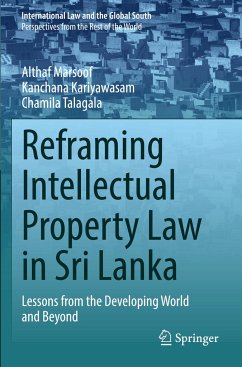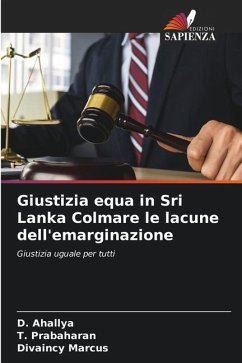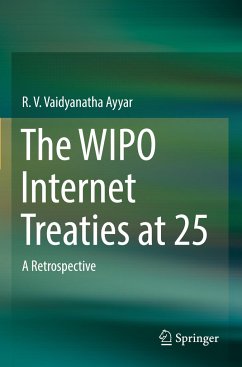
Dilemmas of Intellectual Property Discourse in Sri Lanka

PAYBACK Punkte
53 °P sammeln!
This book examines global and national lawmaking in Sri Lanka through three case studies: patent examination, plant variety laws, and technology innovation. It evaluates how various lawmakers influence intellectual property law to support innovation and development in Sri Lanka.The book explores Sri Lanka's intellectual property laws and the mismatch between its international obligations, such as Trade Related Aspects of Intellectual Property Agreement (TRIPS), and the Patent Cooperation Treaty (PCT), and their implementation. It examines the repercussions of this mismatch and provides insight...
This book examines global and national lawmaking in Sri Lanka through three case studies: patent examination, plant variety laws, and technology innovation. It evaluates how various lawmakers influence intellectual property law to support innovation and development in Sri Lanka.
The book explores Sri Lanka's intellectual property laws and the mismatch between its international obligations, such as Trade Related Aspects of Intellectual Property Agreement (TRIPS), and the Patent Cooperation Treaty (PCT), and their implementation. It examines the repercussions of this mismatch and provides insights for the future of Sri Lanka and other small developing countries. Based on socio-legal research, the book reveals the nature of local and global discourses and the lawmaking processes regarding intellectual property in Sri Lanka. While international law advocates strong standards for inventiveness in patent examination, plant breeders' rights, and technology transfer to supporthigh-tech development, Sri Lanka has been reluctant to implement such laws.
This book is a crucial resource for researchers, policymakers, and legal professionals interested in intellectual property law, innovation ecosystems, and the socio-legal aspects of lawmaking in developing countries.
The book explores Sri Lanka's intellectual property laws and the mismatch between its international obligations, such as Trade Related Aspects of Intellectual Property Agreement (TRIPS), and the Patent Cooperation Treaty (PCT), and their implementation. It examines the repercussions of this mismatch and provides insights for the future of Sri Lanka and other small developing countries. Based on socio-legal research, the book reveals the nature of local and global discourses and the lawmaking processes regarding intellectual property in Sri Lanka. While international law advocates strong standards for inventiveness in patent examination, plant breeders' rights, and technology transfer to supporthigh-tech development, Sri Lanka has been reluctant to implement such laws.
This book is a crucial resource for researchers, policymakers, and legal professionals interested in intellectual property law, innovation ecosystems, and the socio-legal aspects of lawmaking in developing countries.












